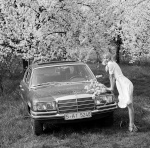The concept of open two-seater and easily operated, weatherproof top was so successful that even the 300 SL was modified correspondingly. In the spring of 1957, the legendary Gullwing was replaced by a roadster version that from then on permitted open-top motoring even in this class of high-performance sports cars.
With this roadster, Mercedes-Benz offered its customers a car for comfortable and fast traveling – or a luxurious cabriolet. Purists and coupe owners, however, referred to the new model as "living room on wheels". An extra weight of 100 kilograms did not exactly benefit performance but at an unchanged output of 215 hp, the roaster still had plenty of muscle. The tubular grid-type frame was retained as the backbone for the roadster as well, though significantly modified in the areas of the doors and rear end. In this way, the engineers created space for an – albeit small – trunk and for "proper" doors which made getting in and out clearly more convenient. A new rear axle – a single-joint swing axle with balancing spring – was incorporated, improving both handling and ride. In 1961, the turbo-cooled duplex drum brakes were replaced by modern disc brakes. Its soft-top – operated easily and conveniently – vanished underneath a separate cover behind the seats. The car's external appearance continued to be unmistakably SL, its face being characterized by headlamp and turn signal integrated under a common lens on each side. A swage line extending from the upper edge in the air outlet in the fender far into the door caught the eye when looking at the car from the side. The company complemented the package by an elegant, easy-to-fit hardtop for winter sports fans in the fall of 1958. This hardtop was so much in demand that it soon became the most frequently ordered option. There was a special, high-performance sports version of the roadster that deserves to be mentioned. Shortly after the start of large-scale production, the Mercedes-Benz sports department prepared a special sports roadster for the American Sports Car Champion of the years 1955/56, Paul O'Shea, making the car as light as possible and giving it just a small windshield on the driver's side – the car was reminiscent of the 1952 roadster in more ways than one. It wasn't quite as fast as the competing Ferraris and Maseratis but it was extremely reliable and took a lot of punishment. At the wheel of this car, O'Shea won the Class D of the 1957 US Sports Car Championship in superior fashion, with three times as many points as the runner-up, Caroll Shelby on Maserati. This last significant championship marked the end of the glorious career of the 300 SL in motor sport – five years after the first 300 SL's start. The 1,858 th – and last – 300 SL roadster came off the assembly line on February 8, 1963, taking the ingenious design of the tubular grid-type frame and the robust, reliable and powerful direct-injection gasoline engine with it. |
 1957
1957
 País :
País : 


 Tópicos semelhantes
Tópicos semelhantes




